adj变换adv分类
- 格式:docx
- 大小:15.43 KB
- 文档页数:2

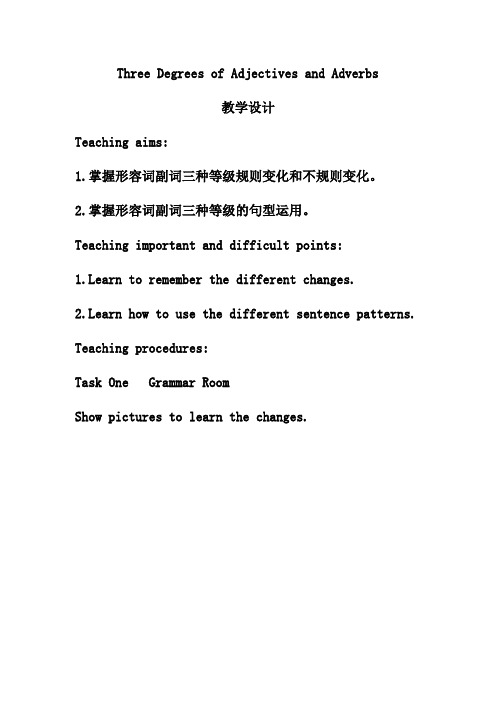
Three Degrees of Adjectives and Adverbs教学设计Teaching aims:1.掌握形容词副词三种等级规则变化和不规则变化。
2.掌握形容词副词三种等级的句型运用。
Teaching important and difficult points:1.Learn to remember the different changes.2.Learn how to use the different sentence patterns. Teaching procedures:Task One Grammar RoomShow pictures to learn the changes.Task Two Chatting Room Let ’s talk about the following pictures1).as+adj/adv 原级…+as.(和…一样…)巧记:特殊形式比较级共有三对二合一坏病两多并两好little 意思不是小一分为二有两个一是老来二是远2).not as (so) + adj./adv.原级+ as3).adj./ adv.比较级+than4).The+比较级, the +比较级: 越…就越…5).比较级+比较级:越来越…6).序数词+最高级7).最高级+of…/ +in…Task Three Discussion RoomSummary Remember the following sentence patterns. :1.very, so , quite, too + 原级 (非常,相当太… )2. … as+原级+as… (“和…一样”)3. …not so/as+ 原级 +as … (“和…不一样”“不如…”)4. 比较级+than… (“比…更…”)5.“The+比较级…,the+比较级…” (“越…就越…”)6 .“…比较级+and+比较级…”或…more and more +原级” (“越来越…”)7.…(the)+最高级+of / in… (在…中最…)8.…one of the+最高级+名词复数 (最…之一)9.…序数词+最高级… (第...最...)10.表示三者之间的选择可使用“Which is+the +最高级…. A, BorC?”Attentions:1.修饰形容词和副词比较级的短语有:much / a lot / a little / a bit / far / even 2.在进行比较时,必须是同类事物相比较。
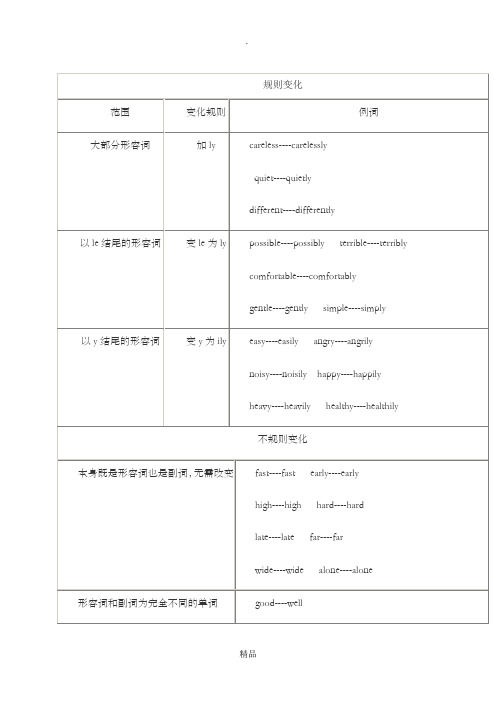
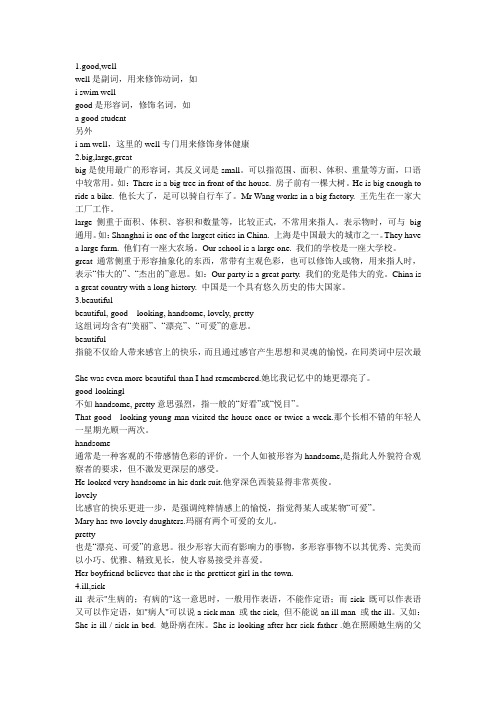
1.good,wellwell是副词,用来修饰动词,如i swim wellgood是形容词,修饰名词,如a good student另外i am well,这里的well专门用来修饰身体健康2.big,large,greatbig是使用最广的形容词,其反义词是small。
可以指范围、面积、体积、重量等方面,口语中较常用。
如:There is a big tree in front of the house. 房子前有一棵大树。
He is big enough to ride a bike. 他长大了,足可以骑自行车了。
Mr Wang works in a big factory. 王先生在一家大工厂工作。
large侧重于面积、体积、容积和数量等,比较正式,不常用来指人。
表示物时,可与big 通用。
如:Shanghai is one of the largest cities in China. 上海是中国最大的城市之一。
They have a large farm. 他们有一座大农场。
Our school is a large one. 我们的学校是一座大学校。
great 通常侧重于形容抽象化的东西,常带有主观色彩,也可以修饰人或物,用来指人时,表示“伟大的”、“杰出的”意思。
如:Our party is a great party. 我们的党是伟大的党。
China isa great country with a long history. 中国是一个具有悠久历史的伟大国家。
3.beautiful这组词均含有“美丽”、“漂亮”、“可爱”的意思。
beautiful指能不仅给人带来感官上的快乐,而且通过感官产生思想和灵魂的愉悦,在同类词中层次最She was even more beautiful than I had remembered.她比我记忆中的她更漂亮了。
good-lookingl不如handsome, pretty意思强烈,指一般的“好看”或“悦目”。
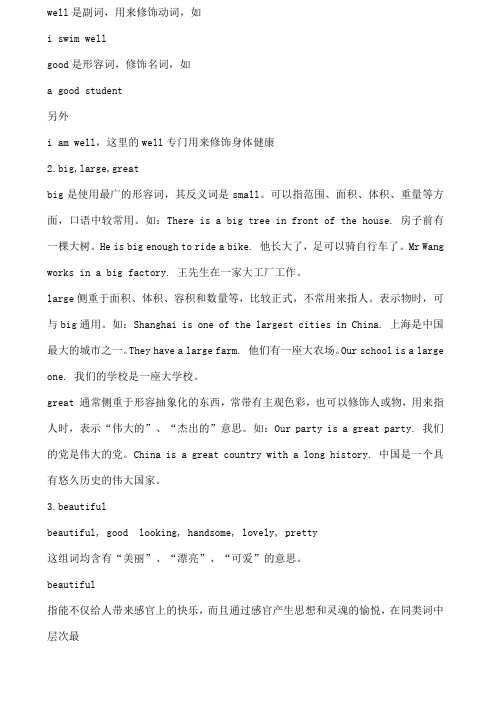
well是副词,用来修饰动词,如i swim wellgood是形容词,修饰名词,如a good student另外i am well,这里的well专门用来修饰身体健康2.big,large,greatbig是使用最广的形容词,其反义词是small。
可以指范围、面积、体积、重量等方面,口语中较常用。
如:There is a big tree in front of the house. 房子前有一棵大树。
He is big enough to ride a bike. 他长大了,足可以骑自行车了。
Mr Wang works in a big factory. 王先生在一家大工厂工作。
large侧重于面积、体积、容积和数量等,比较正式,不常用来指人。
表示物时,可与big通用。
如:Shanghai is one of the largest cities in China. 上海是中国最大的城市之一。
They have a large farm. 他们有一座大农场。
Our school is a large one. 我们的学校是一座大学校。
great 通常侧重于形容抽象化的东西,常带有主观色彩,也可以修饰人或物,用来指人时,表示“伟大的”、“杰出的”意思。
如:Our party is a great party. 我们的党是伟大的党。
China is a great country with a long history. 中国是一个具有悠久历史的伟大国家。
3.beautifulbeautiful, good looking, handsome, lovely, pretty这组词均含有“美丽”、“漂亮”、“可爱”的意思。
beautiful指能不仅给人带来感官上的快乐,而且通过感官产生思想和灵魂的愉悦,在同类词中层次最She was even more beautiful than I had remembered.她比我记忆中的她更漂亮了。
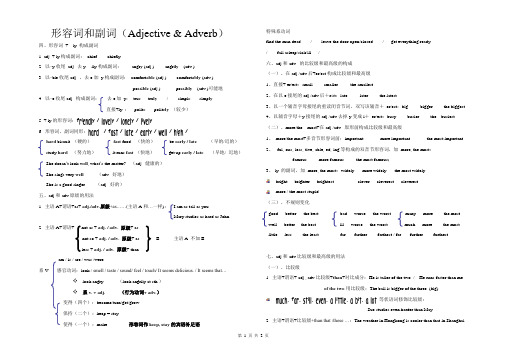
形容词和副词(Adjective & Adverb )四、形容词 + ly 构成副词1. adj. + ly 构成副词: chief ----- chiefly2. 以–y 收尾 adj. 去y ---ily 构成副词: angr y (adj.) ------angr ily (adv.)3. 以–ble 收尾adj. ,去e 加 y 构成副词: comfort able (adj.) ----- comfort ably (adv.) possi ble (adj.) ------ possi bly (adv.)可能地4. 以–e 收尾adj.构成副词:去e 加 y : tru e --- tru ly / simpl e ---- simp ly直接+ly : polit e ---- polit ely (较少)5. + ly 的形容词:friendly / lovely / lonely / lively6. 形容词、副词同形:hard / fast / late / early / well / high /hard biscuit (硬的) fast food (快的) be early / late (早的/迟的) study hard (努力地) it runs fast (快地) get up early / late (早地/ 迟地) She doesn ’t look well , what ’s the matter? (adj. 健康的) She sings very well . (adv. 好地) She is a good singer. (adj. 好的) 五、adj.和adv.原级的用法1. 主语A+谓语+as+ adj./adv.原级+as……(主语A 和…一样): I am as tall as you.Mary studies as hard as John. 2. 主语A+谓语+ not as + adj. / adv. 原级+ asnot so + adj. / adv. 原级+ as B 主语A 不如Bless + adj. / adv. 原级+ thanam / is / are / was /were系V. 感官动词:look / smell / taste / sound/ feel / touch/ It seems delicious. / It seems that…✧ look angry (look angrily at sth.) ✧ 系v. + adj. (行为动词+ adv.)变得(四个):become/turn/get/grow保持(二个):keep = stay使得(一个):make 形容词作keep, stay 的宾语补足语特殊系动词find the man dead / leave the door open/closed / get everything ready / fall asleep/sick/ill / 六、adj.和adv. 的比较级和最高级的构成 (一)、在adj./adv.后+er/est 构成比较级和最高级 1、直接+ er/est :small-------smaller------- the smallest2、在以e 接尾的adj./adv.后+r/st :late -------later-------the latest3、以一个辅音字母接尾的重读闭音节词,双写该辅音+ er/est :big------- bigger-------the biggest4、以辅音字母+y 接尾的adj./adv.去掉y 变成i + er/est :busy-------busier-------the busiest (二)、more/the most+在adj./adv. 原形前构成比较级和最高级1、 more/the most+多音节形容词前:important more important the most important2、 -ful,-ous,-less,-tive,-able,-ed,-ing 等构成的双音节形容词,加 more, the most :famous more famous the most famous;3、-ly 的副词,加 more, the most :widely-----more widely-----the most widely bright --- brighter --- brightest clever --- cleverest --- cleverest more / the most stupid (三)、不规则变化good --- better --- the best bad --- worse --- the worst many --- more --- the most well --- better ---the best ill --- worse --- the worst much --- more --- the most little --- less --- the least far ---- farther ----- farthest / far ---- further ----- furthest七、adj.和adv.比较级和最高级的用法 (一)、比较级1. 主语+谓语+ adj., adv.比较级+than +对比成分:He is taller of the two. / He runs faster than me.of the two 用比较级:The ball is bigger of the three. (big)much, far, still, even, a little, a bit, a lot 等状语词修饰比较级:Sue studies even harder than May.2. 主语+谓语+比较级+than that /those …:The weather in Hongkong is cooler than that in Shanghai.The vegetables in the street markets are better than those in the shops.3. 主语+谓语+比较级+and+ 比较级+… (越来越…)Autumn is coming. It is getting cooler and cooler.4. the+比较级……, the +比较级……(越…就越…)The earlier you start, the sooner you will be back.5. like……better than…… = prefer…to(喜欢…更甚于…)She likes oranges better than apples. = She prefers oranges to apples. (二)、最高级1. one of + 名词(复数) + 形容词(最高级):Shanghai is one of the biggest cities in the world.2. 最高级+of/in/among+比较范围:Shanghai is the biggest city in China.3. 最高级=比较级+than any other+名词(单数)Tom is the tallest student in class. = Tom is taller than any other student in his class.= Tom is taller than other students in his class.4. the +序数词+最高级:The Century Park was the second largest in Shanghai.。
一、名词变复数规则:1.一般名词复数是在名词后面加上“s”,如map→maps,bag→bags,book-books等;2.以s,x,sh,ch结尾的词加“es”,如bus→buses,watch→watches, box-boxes等;3.以f或fe结尾的名词变复数时,去掉f,fe 加ves的名词有:half→halves knife→knives leaf→leaves wolf→wolves wife→wives life→lives thief→thieves4.以o 结尾的名词变复数时:a)加s的名词有:photo→photos ,piano→pianos,radio→radios,zoo→zoosb)加es的名词有:potato→potatoes tomato→tomatoes5.以辅音字母+y结尾的词,变y为i加es,如baby→babies, family-families, study-studies等;以元音字母+y结尾的名词变复数时,直接加s变复数,如monkey→monkeys,holiday→holidays,store y→storeys(楼层);6. oo变ee的单词:foot-feet, goose-geese,tooth-teeth;7. a变e的单词:man-men, woman-women, policeman-policemen;8. 复数与原形一致的单词:fish-fish, sheep-sheep, deer-deer, Chinese-Chinese, Japanese-Japanese;9.最特殊的一个:German-Germans.二、第三人称单数时动词变化规则:1、一般现在时主语为第三人称单数时的动词变化①在一般现在时中,当主语为第三人称单数时,动词要用“s”型(即第三人称单数形式)。
②所谓动词“s”型的构成,可按名词变复数的规则来记,即:1. 在动词尾直接加s。
Unit-15 Let’s find it quickly!重点词汇新增词汇形容词—副词1.直接加ly。
2.以辅音字母+y 结尾的,变y 为i 加ly。
3.以辅音+元音+辅音组成的形容词,双写最后一个字母再加ly。
slow—slowly loud—loudly quiet—quietly quick—quickly happy—happily careful—carefully 慢的慢地大声的大声地安静的安静地快的快速地快乐的快乐地细心的细心地beautiful—beautifully different—differently bad—badly good—well漂亮的漂亮地不同的不同地差的好的basement地下室film电影balcony阳台shoulder肩膀flag旗帜snowflake雪花重点句型Kate is beautiful. 凯特很漂亮。
Kate dances beautifully. 凯特舞蹈跳地很好看。
The music is loud. 音乐声音很大。
Bob speaks loudly. 鲍勃讲话很大声。
Joy is a careful boy. 乔伊是一个细心的男孩。
Joy writes carefully. 乔伊写字很认真。
Millie is happy. 米莉很开心。
Millie sings happily. 米莉唱地很开心。
A:What do you want to buy? 您想买点什么?B: I want to buy a radio. 我想买一台收音机。
A: How much is it? / How much does it cost? 多少钱?B: It’s 30 yuan. / It costs 30 yuan. 30元。
课后作1. 听写单词:slow—slowly、loud—loudly、quiet—quietly、quick—quickly、happy—happily、careful—carefullybeautiful—beautifully、different—differently、bad—badly、good—well2.背第2部分。